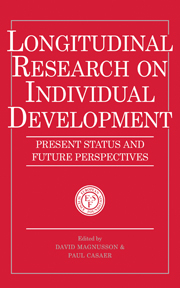Book contents
- Frontmatter
- Contents
- List of principal contributors
- Foreword
- Preface
- 1 Human ontogeny: a longitudinal perspective
- 2 Genes, experience and development
- 3 The human brain and longitudinal research in human development
- 4 Longitudinal research and a biology of human brain development and behaviour
- 5 Cognitive, social and emotional development
- 6 Developmental psychopathology: some historical and current perspectives
- 7 Developmental psychopathology as a research perspective
- 8 Longitudinal research on human aging: the power of combining real-time, microgenetic and simulation approaches
- 9 Development, aging and control: empirical and theoretical issues
- 10 Some methodological issues in longitudinal research: looking ahead
- Index
2 - Genes, experience and development
Published online by Cambridge University Press: 22 March 2010
- Frontmatter
- Contents
- List of principal contributors
- Foreword
- Preface
- 1 Human ontogeny: a longitudinal perspective
- 2 Genes, experience and development
- 3 The human brain and longitudinal research in human development
- 4 Longitudinal research and a biology of human brain development and behaviour
- 5 Cognitive, social and emotional development
- 6 Developmental psychopathology: some historical and current perspectives
- 7 Developmental psychopathology as a research perspective
- 8 Longitudinal research on human aging: the power of combining real-time, microgenetic and simulation approaches
- 9 Development, aging and control: empirical and theoretical issues
- 10 Some methodological issues in longitudinal research: looking ahead
- Index
Summary
OBSERVATIONS AND INFERENCES
Longitudinal research provides the most secure and believable basis for making inferences from observations about human development. When developmentalists observe changes in development and associations between parental and child behaviours, we usually make inferences about the ways in which different parental rearing techniques affect children's intellectual, social, and emotional development. Only by following development across life-spans can one study the intricate interplay of biological and social forces that shape individual lives.
Both parents and psychologists observe pervasive correlations between characteristics of parents, the environments they provide, and their children's outcomes. Both parents and psychologists make causal attributions to those correlations: they believe that differences in parental behaviours and environments cause differences in children's outcomes. The construction of causal inferences from the web of parent–child correlations is fraught with logical and scientific problems (Scarr, 1985). Longitudinal studies make the life course of development clearer, so that causal inferences about parental effects on their children are illuminated.
Ever since Bell's (1968) seminal paper on children's effect on their own environments, as well as vice versa, numerous studies have shown that, indeed, children do have an effect on the behaviour of their caregivers (e.g. Breitmayer & Ricciuti, 1988; Bell & Harper, 1977; Lytton, 1980; McCartney, in press). Using a variety of research designs and outcome measures, these studies have all demonstrated that, rather than being passive recipients of care, infants and children are active, influential partners in their interactions with the people around them.
- Type
- Chapter
- Information
- Longitudinal Research on Individual DevelopmentPresent Status and Future Perspectives, pp. 26 - 50Publisher: Cambridge University PressPrint publication year: 1993
- 2
- Cited by



